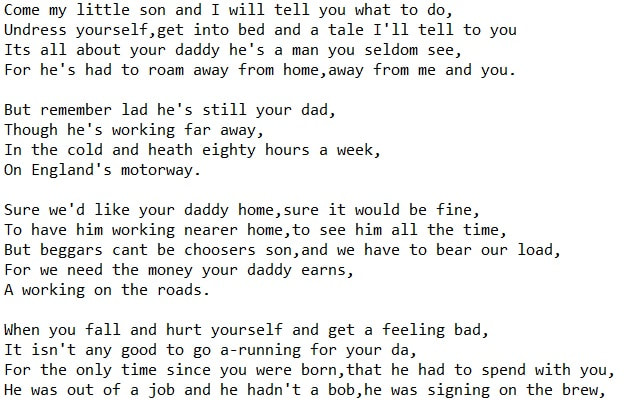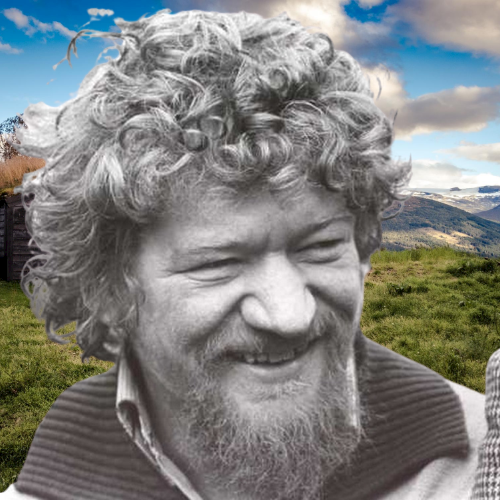England's Motorway, come my little son lyrics and chords
The Dubliners Lyrics And Chords. Written by Ewan McColl With Luke Kelly singing. Try a capo on the 2nd.fret and you will be playing in the key of D. These are the chords I use. I have given the chords for the Luke Kelly version also. This folk song by Ewan McColl is all about an Irishman working on the roads of England and the wife and son at home pining for the father. Luke sang a similar song about working on roads which was The Hot Asphalt Song .Also sang by Blue Highway and Annmarie O’Riordan also recorded Come My Little Son in 2020.
Come[C] my little[F] son and I will tell you what to[C] do,
Undress yourself,get[F] into bed and a[C] tale I'll tell to[Am] you
Its[C] all about your[F] daddy he's a[C] man you seldom [Am]see,
For he's[C] had to roam[F] away from home,away from[C] me and you.
[Chorus]
But remember lad he's still your dad,
Though he's working far away,
In the cold and heath eighty hours a week,
On England's motorway.
[2]
Sure we'd like your daddy home,sure it would be fine,
To have him working nearer home,to see him all the time,
But beggars cant be choosers son,and we have to bear our load,
For we need the money your daddy earns,
A working on the roads.
[3]
When you fall and hurt yourself and get a feeling bad,
It isn't any good to go a-running for your da,
For the only time since you were born,that he had to spend with you,
He was out of a job and he hadn't a bob,he was signing on the brew,
[Chorus]
Undress yourself,get[F] into bed and a[C] tale I'll tell to[Am] you
Its[C] all about your[F] daddy he's a[C] man you seldom [Am]see,
For he's[C] had to roam[F] away from home,away from[C] me and you.
[Chorus]
But remember lad he's still your dad,
Though he's working far away,
In the cold and heath eighty hours a week,
On England's motorway.
[2]
Sure we'd like your daddy home,sure it would be fine,
To have him working nearer home,to see him all the time,
But beggars cant be choosers son,and we have to bear our load,
For we need the money your daddy earns,
A working on the roads.
[3]
When you fall and hurt yourself and get a feeling bad,
It isn't any good to go a-running for your da,
For the only time since you were born,that he had to spend with you,
He was out of a job and he hadn't a bob,he was signing on the brew,
[Chorus]
If you want to play along with Luke Kelly then use the following chords.
[F#]Come my little[C#] son and [F#I will tell you what to do,
Undress your[B]self,get into [F#]bed and a[C] tale I'll tell to[D#m] yo[B]u
Its[F#] all about your[B] daddy [F#]he's a man you seldom [D#m]]se[B]e,
For he's[F#] had to [G#m]roam away from [F#]home,far a[C#]way from[F#] me and you.
[Chorus]
[F#]But remember [B]lad he's still your [F#]dad,
Though he's working far a[D#m]wa[B]y,
In the [F#]cold and [G#m]heath eighty hours a [F#]week,
On [C#]England's [F#]motorway.
[F#]Come my little[C#] son and [F#I will tell you what to do,
Undress your[B]self,get into [F#]bed and a[C] tale I'll tell to[D#m] yo[B]u
Its[F#] all about your[B] daddy [F#]he's a man you seldom [D#m]]se[B]e,
For he's[F#] had to [G#m]roam away from [F#]home,far a[C#]way from[F#] me and you.
[Chorus]
[F#]But remember [B]lad he's still your [F#]dad,
Though he's working far a[D#m]wa[B]y,
In the [F#]cold and [G#m]heath eighty hours a [F#]week,
On [C#]England's [F#]motorway.
Guitar chords for the key of G
Come[G] my little[C] son and I will tell you what to[G] do,
Undress yourself,get[C] into bed and a[G] tale I'll tell to[Em] you
Its[G] all about your[C] daddy he's a[G] man you seldom [Em]see,
For he's[G] had to roam[C] away from home,away from[G] me and you
Come[G] my little[C] son and I will tell you what to[G] do,
Undress yourself,get[C] into bed and a[G] tale I'll tell to[Em] you
Its[G] all about your[C] daddy he's a[G] man you seldom [Em]see,
For he's[G] had to roam[C] away from home,away from[G] me and you
Below is the list of sheet music and tin whistle songs that are in my ebooks. This is the largest collection of tin whistle songs ever put together.[over 800 songs ] Including folk, pop and trad tunes plus German And French songs along with Christmas Carols.
All of the sheet music tabs have been made as easy to play as was possible.
The price of the ebooks is €7.50
All of the sheet music tabs have been made as easy to play as was possible.
The price of the ebooks is €7.50


